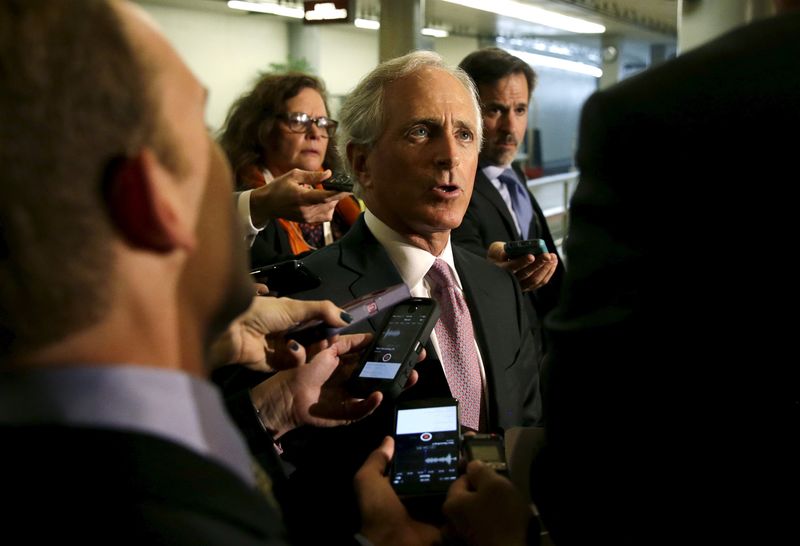By Patricia Zengerle
WASHINGTON (Reuters) - As talks on an Iran nuclear deal enter the final stretch, U.S. lawmakers are sharpening warnings against a "weak" agreement and laying down red lines that, if crossed, could prompt Congress to trip up a carefully crafted international pact.
Several influential lawmakers said they do not want to see any sanctions lifted before Tehran begins complying with a deal, and want a tough verification regime, in which inspectors could visit Iranian facilities anytime and anywhere.
They also want Tehran to reveal past military dimensions of its nuclear program, particularly after Secretary of State John Kerry seemed to soften the U.S. stance last week, by saying Iran would not be pressed on this point.
"I have become more and more concerned with the direction of these negotiations and the potential red lines that may be crossed," said Senator Bob Corker, the Republican chairman of the Senate Foreign Relations Committee.
Countering such concerns, officials said Thursday that Kerry had phoned Iran's foreign minister to say that Tehran must answer questions about whether its past atomic research was arms-related if it wants a deal.
Corker authored a bill giving Congress the right to approve or disapprove of any final agreement that emerges from talks between six major powers and Iran. Kerry travels to Vienna on Friday for the latest round.
DEADLINE
The talks are expected to drag past a self-imposed June 30 deadline to end nearly two years of negotiations aimed at restricting Iran's nuclear program in return for sanctions relief.
But a senior U.S. official said Thursday negotiators could see a way to a very good nuclear agreement.
President Barack Obama signed the Corker bill into law last month after the White House failed to persuade enough of his fellow Democrats not to join Republicans in demanding a say.
As the deadline nears, lawmakers are under pressure not to support an agreement that gives much ground to Tehran.
AIPAC, the influential pro-Israel lobby, has been pushing its concerns that a pact could be "fundamentally flawed."
J Street, a more moderate pro-Israel group, has launched its own campaign rebutting arguments made by deal opponents.
Several other groups are spending millions of dollars on advertising, urging lawmakers to take a hard line.
"There is tremendous skepticism about this deal ... and some Democrats from heavily pro-Israel communities are going to have a tough time with this," Republican Senator John McCain said.
Several prominent American security advisers, including five with ties to Obama's first term, warned in an open letter that a deal risked failing to provide adequate safeguards.
"Good for them," John Boehner, the Republican Speaker of the House, told a news conference on Thursday. "We're about to get stuck with a bad deal, with a bad regime."
ISSUE OF INSPECTIONS
Even if there are 60 votes in the Senate and a majority in the House to advance a resolution of disapproval, the measure would almost certainly face an Obama veto.
To get the two-thirds majority in both houses of Congress to override a veto, deal opponents would need at least 13 Democrats in the Senate and 43 in the House to vote against Obama.
That appears unlikely, but significant weaknesses in a final pact would make it less so, lawmakers from both sides said.
The Congressional demands for a watertight deal put U.S. negotiators under additional pressure not to give Iran much leeway.
Virginia Senator Tim Kaine, a Democrat, said a deal would be a "non-starter" for him if, for example, Iran refused to allow inspections on military bases.
"The two biggest issues for people will be the intrusive nature of the inspections and how comprehensive they are, and the timing of sanctions relief," he said.
Western officials say inspections of military sites are critical to checking whether Iran is pursuing a clandestine nuclear weapons program.
Concerns on Capitol Hill were heightened this week when Iranian Supreme Leader Ayatollah Ali Khamenei ruled out inspections of military sites and said sanctions must be lifted as soon as a deal is reached.
"It would be better if there were encouraging statements coming out of Tehran," said Representative Eliot Engel, the top Democrat on the House Foreign Affairs Committee.
"Then we would feel at least that maybe they do want to change their attitudes and maybe we should change some of our attitudes, too, but I haven't seen it."
Corker's "Iran Nuclear Review Act of 2015" passed the Senate by 98-1 and the House by 400-25.
TOUGH SELL
It gives the Obama administration until July 9 to transmit a final nuclear deal to Congress, triggering a 30-day period in which the Senate and House can consider a resolution approving it, vote on a resolution of disapproval or have no vote at all.
The measure bars Obama from waiving any sanctions on Iran approved by Congress during the review period, plus 22 days if Congress passes a disapproval resolution and Obama vetoes it.
If a resolution of disapproval survived a veto, Obama would be barred from waiving Congressional sanctions. Since those account for the vast majority of U.S. sanctions, it could cripple any nuclear deal.
The review period doubles to 60 days if Congress gets a deal between July 10 and Sept. 7. If there were no deal by Sept. 7, legislators would seek to pass additional sanctions.
Several Democrats said they were confident most of their party would be comfortable approving a deal largely similar to a framework pact announced in April.
But they acknowledge any pact will be a tough sell across the aisle.

"The majority of Republicans are going to vote against anything that has President Obama's signature on it," Democratic Senator Chris Murphy said.